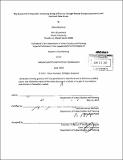The residential energy map : catalyzing energy efficiency through remote energy assessments and improved data access
Author(s)
Howland, Alexis (Alexis Blair)
DownloadFull printable version (19.70Mb)
Alternative title
Catalyzing energy efficiency through remote energy assessments and improved data access
Other Contributors
Massachusetts Institute of Technology. Department of Urban Studies and Planning.
Advisor
Harvey Michaels.
Terms of use
Metadata
Show full item recordAbstract
Although energy efficiency has potential to be a significant energy resource in the United States, many energy efficiency projects continue to go unrealized. This is especially true in the residential sector, where efficiency programs, frequently administered by utilities, see very low participation rates. However, growing access to data and the growing prevalence of mapping technologies provide new avenues for introducing energy performance information in ways that could encourage increased energy efficiency implementation. Renters and homebuyers are increasingly using online interactive maps to inform their housing choices. If energy data is mapped or incorporated into an existing real estate map, energy efficiency could become a valued asset that influences housing decisions and encourages building upgrades by property owners. However, major obstacles remain in accessing the data necessary to create meaningful energy maps. Privacy is the most significant barrier to displaying building-level energy consumption and performance information. This thesis explores how an energy map could catalyze energy efficiency upgrades, specifically in the residential market. This research examines existing energy maps, existing energy assessment platforms and what data they use, and evaluates the state of energy data access in the United States. It seeks to answer what data is necessary to map building level energy performance, what policies are necessary to access that data, and how should energy information be displayed in a map for the most meaningful impact. This research suggests that State mandates may be necessary to access individual residential building energy data; that the Federal government should recommended a standardized platform, such as the Standard Energy Efficiency Data platform, to create a national standard for storing energy data and data taxonomy; and that an energy map will be most effective when displaying a relative energy performance score which could possibly be calculated from energy data and other publicly available building records.
Description
Thesis (M.C.P.)--Massachusetts Institute of Technology, Dept. of Urban Studies and Planning, 2013. Cataloged from PDF version of thesis. Includes bibliographical references (p. 67-71).
Date issued
2013Department
Massachusetts Institute of Technology. Department of Urban Studies and PlanningPublisher
Massachusetts Institute of Technology
Keywords
Urban Studies and Planning.